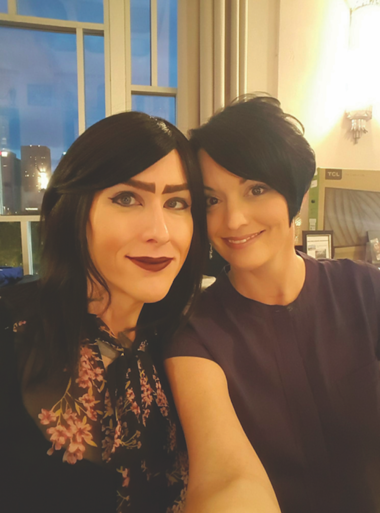Your spouse is transitioning, what's next?

by Jordan Redman
Staff Writer
“I didn’t marry a gender, I married an amazing person with a generous soul,” said Cristina Hernández-Wertz, wife of Kira Wertz.
For some people, learning the truth about their partner’s gender identity solves a lot of mysteries, answers a lot of questions and clarifies a lot about their partner’s behavior. It can be a turning point for any marriage.
Hernández-Wertz initial reaction was sadness. “The reality this was actually happening was like a wound to my heart. I had to say goodbye to my husband. I was sad and confused by it all. Saying goodbye to what I thought my life was; what it was supposed to be.
“That’s hard to swallow. I’m not going to lie. There is a sense of loss, which I think is a natural reaction. Of course, there was also some anger. Okay, maybe a lot of anger at one point. Life never ends up how we plan. That’s something I’ve learned throughout this entire process. Makes you stronger for sure.”
Their relationship has changed. “It has been a roller coaster of sorts in the 16 months since Kira first came out. It was really difficult the first year. I was deeply emotional and felt disconnected from her, but now I feel we have a better understanding of each other.
“We’ve still got work to do. But that is most marriages regardless of whether your partner is trans or not. It’s a constant work in progress. I feel closer to her for sure. And I’ve always got a shopping partner now too!”
The couple has a strong support system to lean on including support of family members. A luxury few couples in this situation have.
The Hernández-Wertz family has accepted Kira. They said, “Other than her pronouns and way of presenting herself to the world, nothing changed. She’s still the same funny, caring, intelligent person.”
Hernández-Wertz added, “It’s great they knew that.”
Among the imminent questions spouses of transgender people face, there is “does staying with my spouse after they transition make me gay?”
Hernández-Wertz said people ask if she considers herself a lesbian now.
“I even questioned myself and wondered about my sexual orientation. I remember saying to my mom one evening, ‘Well, I guess I’m a lesbian now.’ Very matter of fact. My mom, always being the voice of reason said, ‘No, you’re not.’
“And that’s when it hit me. I do still identify as a heterosexual woman. I just happen to be married to a transgender woman. Which I’m sure some people have a hard time wrapping their minds around, but it makes total sense to me.”
Hernández-Wertz has evaluated her sexual orientation since Kira began transitioning, “Now, I see love more fluid. When your spouse comes out as transgender, you question everything you thought you knew about sexuality.
“I never gave much thought to other people’s sexuality. I still don’t; it’s not my business. I don’t know why some people think it’s their business. The reality is I love this amazing human being. That should be enough for anyone. I think if society could see it that way we’d be much better off.”
Hernández-Wertz offers words of wisdom for others in this situation. “Look for support where you can find it. At first, I found it hard to come by, but it’s out there. Either online or in a local support group.
“There aren’t many people in my situation. If there are, they aren’t openly talking about it which is why I think it’s important to start the conversation. It’s always wonderful to talk to someone who can relate, who have experienced the same emotions and may have a perspective you have not thought about.”
She encourages couples not to be afraid. “It’s fear of the unknown. For some, fear is why they leave their spouse upon transitioning. I say, remember why you married this amazing person in the first place. Yes, their appearance has changed, and some of their interests may have changed too, at their core they’re the same person.
When we can start seeing people as just people and strip away gender, it makes it easy. No, not at first. But as I often say, ‘I didn’t marry a gender; I married an amazing person with a generous soul.’”
Hernández-Wertz closed with this advice, “Go to marriage counseling and get into individual counseling. I was very resistant to it at first. I thought I could handle this all on my own. Count yourself blessed to be part of this amazing journey of self-discovery for both your spouse and for yourself.
“The more visible we are, the more we can educate. I believe that’s important for the community to thrive. We as spouses, or as friends and family, when we stand up and say, ‘hey I love someone who is transgender,’ it shows society they matter because they do! The more inclusive we can be of everyone, the better off we will be.”
The Gayly. April 6, 2018. 10:12 p.m. CST.





